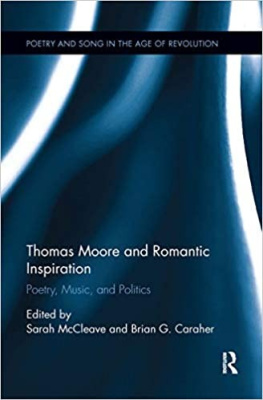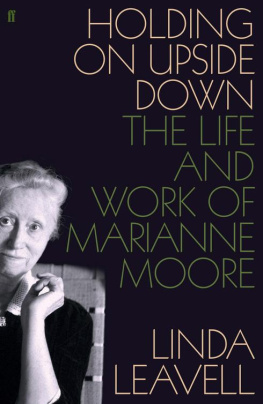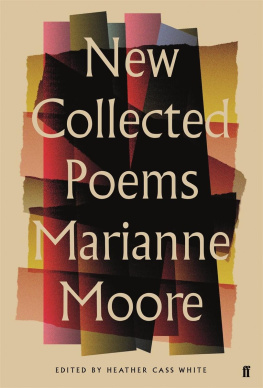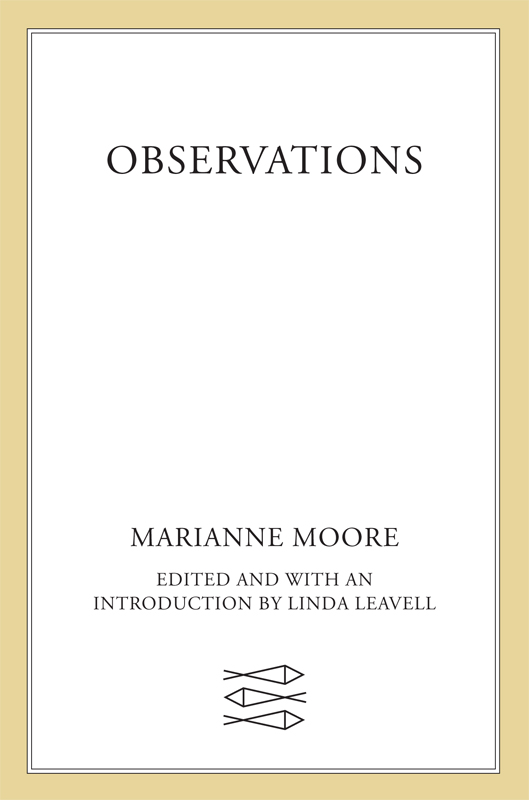Contents
Guide


The author and publisher have provided this e-book to you for your personal use only. You may not make this e-book publicly available in any way. Copyright infringement is against the law. If you believe the copy of this e-book you are reading infringes on the authors copyright, please notify the publisher at: us.macmillanusa.com/piracy. Please note that poem formatting is best represented on your eReading device at smaller text sizes. It took some arm-twisting to get Moore gave them all the same excuse: that her body of work was too slight for a book.
The excuse was partly disingenuousshe had more than enough poems each timeand partly strategic. In 1921 H.D. and Bryher brought out Moores first book, Poems , against her explicit objections. This infuriated Moore. She wrote to Bryher, who had financed the publication, that she had considered the matter from every angle and decided that it was not to her literary advantage to publish a book just then. And she was right.
Reviews of Poems were outright hostile. Three years later critics greeted Observations with enthusiasm. The editors of The Dial , the leading literary arts magazine of the 1920s, had persuaded Moore to publish the book so that they could surprise her with the annual Dial Award. She was the second poet, after Eliot, to receive this coveted award. It went subsequently to E. E.
Cummings, Williams, and Pound. Along with H.D. and Wallace Stevens, these are the modernist poets with whom Moore associated both in person and in print throughout her life. This is the circle of admirers that Herbert S. Gorman referred to when, reviewing Observations for The New York Times , he wrote that Moores verse has long since overgrown the limitations of a coterie. Certainly no one who possesses a quick interest in contemporary American poetry, he continued, can afford to remain in ignorance of her sharp, intellectually compact, aristocratic work.
And yet, nearly a century later, too many readers do remain in ignorance of Moores poetry. She was not peripheral to this coterie. Rather, she was, according to Williams, a rafter holding up the superstructure of our uncompleted building. Observations stands with Eliots The Waste Land (1922), Pounds early Cantos , Williamss Spring and All (1923), and Stevenss Harmonium (1923) as one of the landmarks of modernist poetry. Not since 1925, however, has Observations been available to the general reader. Moore cut its fifty-four poems to forty when she assembled her Selected Poems in 1935 and cut still more when she put together her Complete Poems in 1967.
Moore had by then garnered readers from far outside her original circle. Her Collected Poems of 1951 received the Pulitzer Prize, the National Book Award, and the Bollingen Prize. With the onset of World War II she distanced herself from her early work because critics had convinced her that it was too difficult. Yet in the decades after her death in 1972, Moores advocates have come to value her modernist work as her greatest achievement. What was it about Moores early poetry that so excited her fellow modernists? Initially it was her departure from sentimentality. From the time Moore began writing poems for the Bryn Mawr literary magazine in 1907, the year she turned twenty, she shunned subjects such as spiritual aspiration, love, and meditation and preferred instead what she called critical poetry, the informal Browning kind, because it is the most impersonal and unforced.
She was the first major poet to appropriate for poetry the language of textbooks and commerce. Readers relish her incongruously precise phrases such as Certain Ming products, the lions ferocious chrysanthemum head, and miniature cavalcades of chlorophylless fungi. Such language strips away the smudges of romance, as when she calls marriage first an institution and then an enterprise, or when she says to the rose, beauty is a liability. Over the course of the decade during which she wrote the poems in Observations , her precision evolved into more than wit. But so radical were her views that not even her most sympathetic critics at the time tried to interpret them. Twenty-first-century readers may find them more recognizable.
To confuse mushrooms with poisonous toadstools or mettlesomeness with appetite, she writes in England, is to confess that one has not looked far enough. In The Labors of Hercules, it requires a heroically open mind to look beyond racial and national stereotypes. And in Marriage, Daniel Websters famous dictum Liberty and union / Now and forever, discovered on a statue in Central Park, opens the possibility for a domestic union based on individual freedom rather than misconceptions about gender. An Octopus similarly celebrates the biodiversity of Mount Rainier National Park as a model for democracy. To regard people and other living things without stereotypes, without preconceptions, without egocentricity or greed, is for Moore to set them free. Relentless accuracy, as she calls it in An Octopus, is her moral and political imperative.
Just as the scientist, the critic, and the artist must observe their subjects with precision, so must the citizen and the lover strive to see the other person as an individual. This is for Moore heroic work, an act of love. Although reviews of Observations had little to say about Moores innovative use of quotations, Scofield Thayer, editor of The Dial , privately asked if her quotation marks always referred to anothers words or if she ever used them just for emphasis. She had been incorporating quotations and so-called found poems in her work from the time she started writing verse. When she answered that her quotations did come from other sources unless spoken by a character in the poem, he replied that taking them out of their original context enhanced the beauty of the original or, better yet, twisted the original meaning into its opposite. Unlike the quotations in the Cantos and The Waste Land , those in Observations are not allusions to be recognized by the erudite.
When her source is a famous writer such as Tolstoy or Browning, she usually extracts an offhand remark from a diary or a letter rather than from a masterpiece. And she is just as likely to quote a fashion magazine, a newspaper advertisement, or a comment overheard at the circus as she is Shakespeare. She was the first of the modernists to use quotations this way and resembles the collage artists of her time who appropriated for their canvases scraps of newspaper, playing cards, and other found objects. Thayer asked Moore about her quotations after accepting Sea Unicorns and Land Unicorns for The Dial . He thought he recognized upon her lap, / its mild wild head doth lie. Moore answered him with a three-page, single-spaced letter providing sources for all the quotations in the poem.
The lines he had taken for a literary allusion were from an anonymous poem in Punch , she told him. She disliked the poem except for those lines. He suggested that she include this information in Observations , and she decided to annotate all her quotations. She had never added notes to her poems before and painstakingly searched through her notebooks and library for her sources. She thereafter included citations in all her poetry books, though rarely for poems in magazines. The notes not only heighten the irony of her quotations; they also reveal the poets mind selecting what it needs from the verbal ephemera of modern existence.










 The author and publisher have provided this e-book to you for your personal use only. You may not make this e-book publicly available in any way. Copyright infringement is against the law. If you believe the copy of this e-book you are reading infringes on the authors copyright, please notify the publisher at: us.macmillanusa.com/piracy. Please note that poem formatting is best represented on your eReading device at smaller text sizes. It took some arm-twisting to get Moore gave them all the same excuse: that her body of work was too slight for a book.
The author and publisher have provided this e-book to you for your personal use only. You may not make this e-book publicly available in any way. Copyright infringement is against the law. If you believe the copy of this e-book you are reading infringes on the authors copyright, please notify the publisher at: us.macmillanusa.com/piracy. Please note that poem formatting is best represented on your eReading device at smaller text sizes. It took some arm-twisting to get Moore gave them all the same excuse: that her body of work was too slight for a book.